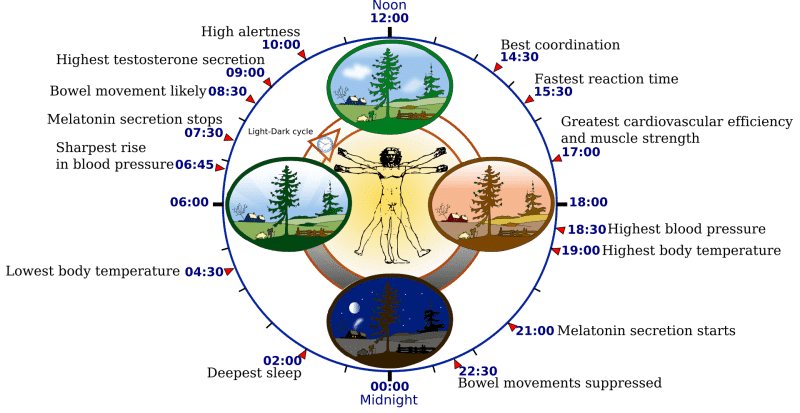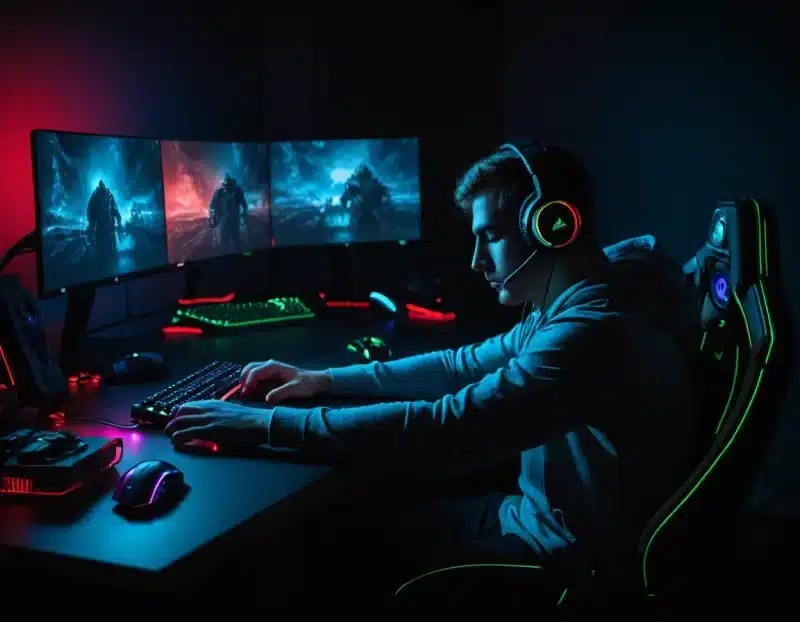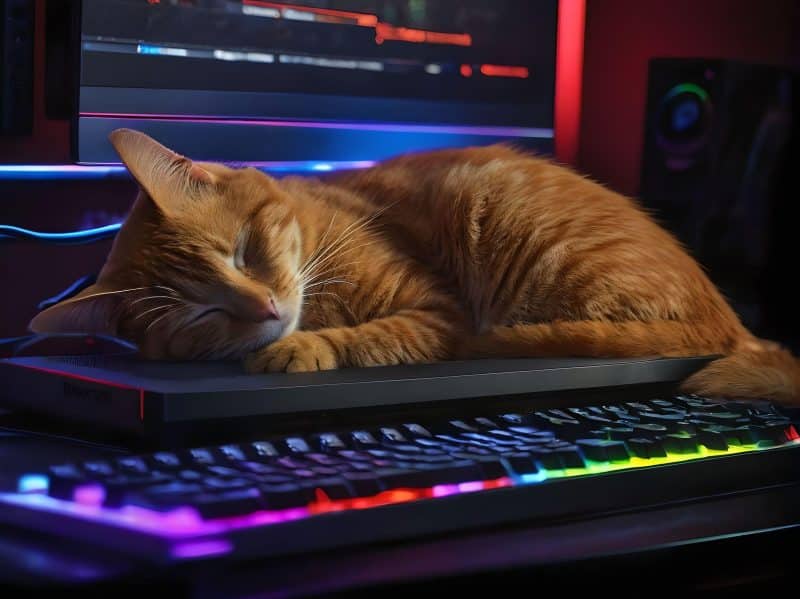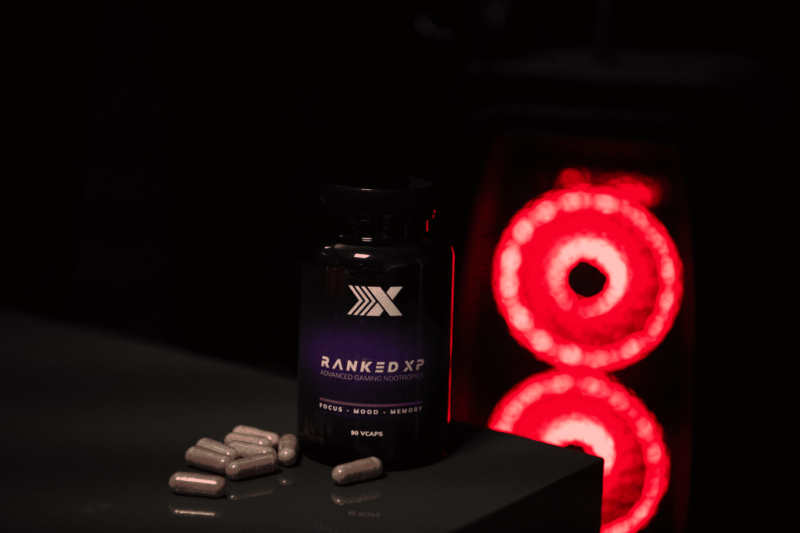Sleep VS Gaming – 7 Strategies To Max Out Your Stats
Sleep and Gaming Are Not Best Friends
Pro gaming and good sleep are two things that are very hard to make compatible. Simple fact.
There’s just something about sitting inside in front of a computer or a TV screen for hours on end that makes it very difficult for people to get good sleep.
Now, that doesn’t mean we’re going to tell you that you need to quit gaming, something you love doing so much. We do want you to be more aware of your lifestyle, and implement strategies to mitigate the damage that your gaming habit could do to your sleep and your biological rhythms.
But first things first. Let’s start by telling you how and why your gaming habits damage your sleep.
How You Mess Up Your Circadian Rhythm
All human beings have something called a circadian rhythm. This is an internal biological clock that tells all the systems in your body what they have to do at a certain time of day, in a 24-hour pattern.
In the morning, when you have to wake up after sleep, your body is going to get a signal from your brain that it’s time to be wakeful and start doing things, go out to gather some food.
Then your levels of hormones like cortisol go up, and that wakes you up, just like when you push the button to boot up your PC. Now your body gets flooded with these hormones that act as signallers for you to be wakeful, alert, and focused.
Later on, in the evening, when it’s time to wind down and recover, the body sends the signals that are required for you to get rest and recuperate.

At least, that’s what happens normally.
You see, these signals are sent at certain times during the day. But for your body to know when to send these signals, it needs to figure out what time of day it is first. If you’re a gamer who’s in the US, it’s going to be morning and evening at different times then if you were a gamer living in Europe.
There is no internal clock that you can manually set with a visible button or a remote, like you would your alarm clock. Instead, what your body does is use cues from your environment to set the clock and figure out when to do what. Scientists call these cues ‘zeitgebers’ (a German word for ‘time givers’).
First cue – light
In practice, these cues are kind of what you would expect them to be. The first one is light, because obviously, in a natural environment, the only time that it’s daytime is when the sun is shining.
The sun exposes you to massive amounts of light, especially light in the blue light wavelength. This kind of light is the most powerful signal that tells your brain to know that it’s daytime.
The amount of light is measured in ‘lux’, and on a sunny day, when you’re outside, the amount of light that enters your eyes can reach up to around 100.000 lux. Even when it’s overcast, you could still get up to tens of thousands of lux.

On the other hand, when you’re inside, exposed to a computer screen, the amount of light, depending on the type of screen you use, would be something from 1 to 40 lux.
Even if you are exposed to some indoor environmental lighting, you are rarely exposed to more than 100 lux. That does absolutely nothing to tell your body that it’s daytime.
Most gamers also tend to play a lot at times that they should not be exposed to light at all (those all-nighters do have a certain appeal to them, we know). In normal circumstances, however, you would normally be exposed to an amount of light that is close to zero.
For example, without artificial lighting, at night, even a full moon would not expose you to any more than 1 lux. But if you’re gaming, that can be up to a hundred times more.
This can be very confusing for your brain, and as a result, it doesn’t really know if you’re supposed to be awake or asleep. When this happens, your brain and body aren’t really awake, just ‘kind of’-awake. Your mind is foggy, you don’t have optimal focus, and as a result, your sleep, your mood, and your cognitive performance suffers.
Second cue – movement
Now, let’s add our second important cue: movement.
Again, what tells your body that you are supposed to be awake at that time? The fact that you’re actually moving and doing things. Your body assumes, if you are moving and doing things, it’s probably daytime.
Here’s the thing however: if you’re sitting in front of a computer all day, you’re not being very active. So that signal to your brain that it’s daytime is again very weak. And in your nighttime sessions, you’re being (slightly) active at a time you should be completely immobile.
In addition to you being inside and having little to no light exposure during the day and too much light exposure during the evening, this reinforces that circadian rhythm fog, that Twilight Zone between wakefulness and sleep.
Instead of your mind and body switching ‘on’ and ‘off’, you’re constantly in this grey ‘zombie mode’. This will significantly hurt your gaming performance (as well as your overall health).
Third cue – nutrition
A third element that’s really important in telling your brain and body what time of day it is, is how and when you eat. This is all linked to your old hunter-gatherer style of life, that you may not be living at the moment, but that still remains deeply ingrained in your DNA.
Aside from being inside, having little exposure to light, and not being active, if you are living the standard gaming lifestyle, playing late at night or even doing all-nighters, you might have a bag of chips or some other type of snack or meal nearby when you’re playing.
Normally, you would only eat during the day, when you are supposed to be awake. But when you eat late at night, this also confuses your body. If you are digesting food, this is a signal for your body that it’s daytime.
Fourth cue – temperature
The last cue we’ll mention is temperature. Again, this is a logical one. It’s warmer during the day than it is at night. If it’s warm, your body is probably going to think that it’s daytime, and when it is relatively colder, your body will get the idea that it’s night.
But if you are sitting inside all day, in your gaming room, in an environment that is artificially heated, and where the temperature difference at night is hardly any different from the temperature during the day, your body can’t pick up on that signal.
The Issues With Sleep and Gaming
One issue that arises with online gaming is that by its very nature, you’re often playing with people that are on the other side of the world. Sometimes servers are grouped by geographical region. But usuallly there is nothing that stops you from playing with someone that’s on the other side of the world.
This is part of the appeal of online gaming and let’s face it, is also pretty awesome. But if a European gamer wants to play with his buddy in the USA, it’s likely he’ll have to give up on a bit of sleep. The American gamer is just getting behind the screen when it’s already nighttime for the European gamer.
Besides that, you also need to put in a lot of time and effort if you want to become really good at your favorite game and pwn some n00bs. So that requires a lot of time sitting on your ass behind a screen. If you have an indoor desk job, then it’s already hard to maintain your circadian clock.
The Bad Mojo of Not Getting Enough Sleep
All of this can lead you to getting inside a certain loop that’s hard to get out of. Your circadian rhythm starts getting out of whack. Then you start feeling dazed and unfocused. To counter that, you start using large amounts of caffeine and other stimulants. But then adapt to those, and you start needing more. As time goes on, your baseline energy starts going down further and further.

Here are just a few ways poor sleep affects your gaming performance
Then your game starts to suffer. Which we definitely don’t want.
Fixing Compatibility Issues
So, are we going to tell you to live outside in the wilderness? Live as one with nature, to rebalance your circadian rhythm and your internal biological harmony?
It would be an ideal scenario, health-wise. But you’d have to give up gaming, so that’s not an option. But we can give you easy-to-implement strategies that can will mitigate the damage somewhat. This will create some balance, and allow you to play your favorite games on a full schedule.
So here goes.
One – Get some morning sunshine
If you ignore the importance of enough light exposure during the day, your circadian rhythm will get out of whack. This will cause your sleep to suffer. Luckily, with some small adjustments, you can prevent a lot of that damage.
The most important way you can reset your clock every day is by going outside in the morning. Getting enough morning light is key to help your brain tell the difference between day and night. Ideally, you would go outside for an hour and go for a morning walk.
You’ve probably noticed before that going outside in the morning is very powerful in waking you up. Have a day job or you’re in college? Try to leave the car at home and ride your bike to work or class.

Additionally, combining this morning light exposure with movement provides a very powerful one-two combo signal.
Just this one strategy can already undo a lot of the damage.
Two – Get more light during the day
Obviously, it is very hard for most people to be outside most of the time. You might have a desk job, or it might be kind of cold outside. There’s also the fact that you probably can’t play League of Legends or Counter-Strike outside. (though if you can, definitely do it)
Try get as much light exposure as you can. For example, try going for a walk during lunchtime. This can also be a very powerful extra signal for your brain to reset the internal clock. At the same time, it can give your brain a bit of rest and rewind and lower stress.
If that is not an option, you also have special lightboxes you can put on your desk. These emit a very powerful blue light which mimics sunlight a bit. These lightboxes can emit up to 10.000 lux, so they can be a powerful ally in setting your sleep-wake cycle.
If you use one of these boxes, put them on your desk during daytime hours. This basically tricks your brain into thinking you’re outside and it’s daytime. It’s one of the few circadian cheats that we think are acceptable for pro gamers.
Three – Get enough movement every day
We are always going to tell you to exercise every day. Even pro gamers need physical gainz. Yes, you like sitting behind your desk playing League of Legends. You dream of becoming an esports pro. That doesn’t mean you have to look like the guy from the World of Warcraft episode of South Park. (you know the one)
Improving your circadian rhythm and your sleep is just another good reason for doing this.
It doesn’t matter whether you like running, swimming, or pumping iron. Daily exercise is going to be a powerful catalyst for better sleep and better circadian rhythm. (Aside from the thousand other different physical and mental benefits it provides)

Just half an hour of relatively intense exercise is good. More is better. Of course, you have to balance it out with your gaming routine if you want to git gud.
If you don’t have time or the option of to work out, just go for a walk. This works well too, because you can combine movement with outside light exposure.
Four – Reduce light exposure in the evening
Before going to sleep, you want to reduce light exposure as much as possible. During the day, you want to have a lot of blue light exposure and avoid dark environments. In the evening, you want to have the exact opposite.
There are many ways to reduce this to an acceptable level:
- Install blue light-reducing apps such as f.lux
- Buy a monitor or TV that is low in blue light emission
- Reduce environmental lighting
- Use incandescent light bulbs that are higher in red light and lower in blue light in your gaming room
Five – Reduce Caffeine Intake
While you might feel really energized taking in a lot of caffeine, overconsumption of caffeine will hurt your sleep, your health, and your performance in the long run.
Products that contain caffeine can be beneficial when used properly – there’s caffeine in RANKED XP as well – but you have to be smart in using it.
We wrote an entire article about proper caffeine use – go read it here.
Six – Keep some time in between gaming and going to sleep
If you try to go to bed right after finishing a gaming session, your mind will still be overactive. After all, terrorists were throwing grenades at you just ten minutes ago.
Even though you know it’s all fun and games, your brain doesn’t necessarily know that. After an intense gaming session, the levels of stress hormones in your blood will still be elevated.
These hormones are meant to keep you alert and active when you are in dangerous situations. That means it’s definitely hard to fall asleep when they are still present in your bloodstream.

If you try to go to sleep right after an intense gaming session, it will be harder to fall asleep immediately. To counter this, try to do something calming to wind down before going to bed. Preferably, this is something that doesn’t involve screens, like reading a book or something.
If you don’t like reading, watch TV but something that’s not too exciting (something without guns and zombies ideally).
If you have a significant other, you could try to do a fun, relaxing activity together before sleep. (I’m not talking about Mario Kart.)
Seven – Go to sleep in time and don’t pull any all-nighters

One of the most important things you should do to keep your circadian rhythm balanced is to keep a regular sleep schedule. If you don’t do this, you will confuse your biological clock and your body won’t know what time it is. This is basically the same as giving yourself jetlag every day.
Aaanndd…that’s it for now folks. We’ll be posting more useful tips on improving your sleep in the future. But if you follow these first steps, you’re already on the path to glorious victory 🙂


It’s time for you to join the elite
Level up your mind with our powerful nootropic designed to upgrade your gaming skills.